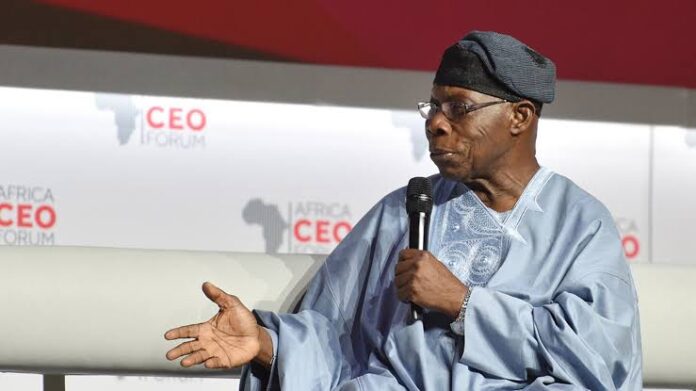In a scathing revelation that has stirred national conversation, former President Olusegun Obasanjo has accused the Nigerian National Petroleum Corporation (NNPC) of rejecting a $750 million proposal from Nigerian business magnate Aliko Dangote to manage the country’s ailing refineries. The refineries, located in Port Harcourt, Warri, and Kaduna, have long been plagued by inefficiency, corruption, and underperformance, despite billions of dollars in government investment.
During an exclusive interview with Channels Television, Obasanjo disclosed that Dangote had offered to manage the refineries through a public-private partnership (PPP) during his administration in 2007. However, despite knowing the NNPC’s inability to operate the refineries effectively, the corporation turned down the offer.
According to Obasanjo, the initial offer came after Royal Dutch Shell, which had also been approached to take over refinery management, declined the proposal. Shell’s refusal, the former president explained, was based on concerns over rampant corruption, poor maintenance, and consistently low production output at the refineries.
“Shell said they wouldn’t touch it with a ten-foot pole. They cited issues like corruption, mismanagement, and low efficiency,” Obasanjo explained during the interview. “Then Aliko Dangote and his team came forward with a $750 million offer to take over the management under a Public-Private Partnership agreement. They were ready to invest, but the NNPC rejected the deal.”
In 2007, the country’s refineries were already in severe decline, with widespread infrastructural neglect and operational challenges hampering Nigeria’s oil production and refining capacity. Despite these persistent issues, the NNPC insisted that it could run the refineries on its own. This decision, Obasanjo claims, has led to disastrous consequences.
“I spoke to my successor about the situation, and he told me that the NNPC was insistent on managing the refineries themselves,” Obasanjo recalled. “I said to him, ‘You know they cannot run it. They have not shown the ability to run it. You are just wasting money.'”
The former president further revealed that since the NNPC turned down Dangote’s offer, more than $2 billion has been spent on the refineries in a futile attempt to bring them back to operational capacity. However, according to Obasanjo, the refineries remain largely ineffective, continuing to operate at suboptimal levels.
“I was recently informed that since that time, over $2 billion has been squandered on the refineries, yet they still fail to deliver on expectations,” Obasanjo lamented. “This is not just a waste of money, it’s a tragedy for the Nigerian people.”
This revelation sheds light on the long-standing inefficiencies that have plagued Nigeria’s oil sector and its downstream infrastructure. For years, successive governments have promised to revitalize the country’s refineries, yet the results have been disappointing, with many of the refineries operating at less than 30% of their refining capacity.
A Missed Opportunity
Aliko Dangote, Nigeria’s richest man, had already built a significant track record of successful ventures in industries such as cement, sugar, and salt, and was eager to extend his reach into the oil sector. His offer to invest $750 million in the refineries was a bid not just to manage them, but to overhaul their operations and bring them up to global standards.
Dangote’s willingness to take the risk was seen by many as an opportunity for private-sector efficiency to turn around what had long been a bloated and inefficient state-run enterprise. But despite his track record and the pressing need for reform, the NNPC and the government of the time rejected the offer.
Obasanjo explained that he had recommended Dangote’s proposal to his successor, but NNPC’s refusal, he said, stemmed from an unwillingness to let go of control of the critical infrastructure. The Nigerian government, through NNPC, insisted on keeping the refineries in its hands, despite mounting evidence of mismanagement.
“What is the reason for rejecting a proposal from someone who has the experience, the capital, and the track record to make it work?” Obasanjo asked. “If Shell didn’t want to touch it, why would NNPC think they could manage it better? It’s baffling.”
From Refusal to Realization
Fast forward to 2025, and the landscape has shifted. The NNPC, now known as the Nigerian National Petroleum Corporation Limited (NNPCL), appears to have had a change of heart. In a dramatic reversal, the corporation is now working with Dangote on his new refinery project, the Dangote Refinery, which is set to be the largest single-train refinery in the world. The refinery, located in Lekki, Lagos, promises to refine 650,000 barrels of crude oil per day, significantly easing Nigeria’s reliance on imported refined petroleum products.
However, Obasanjo has expressed skepticism over the Nigerian government’s newfound enthusiasm. He suggests that NNPC’s shift in attitude may be more about saving face rather than genuine collaboration.
“Now they are working with Dangote, but why didn’t they do it years ago when they had the chance?” Obasanjo questioned. “Dangote has the vision and the capacity to make this work. But we must remember, Nigeria cannot afford to repeat the mistakes of the past. The refineries must be managed professionally and transparently, not as political tools for patronage.”
Obasanjo’s remarks have reignited the debate over the privatization of Nigeria’s oil and gas sector, a topic that has been hotly contested for years. While some argue that privatization could bring the efficiency needed to revitalize the country’s infrastructure, others maintain that strategic state control is essential to safeguarding national interests.
“It is clear that the NNPC was never able to handle the refineries. Now, we are spending billions with no tangible results,” Obasanjo concluded. “I believe in the potential of the private sector, but we must ensure that such partnerships are based on professionalism, not politics.”

